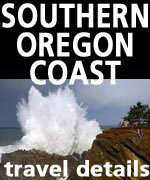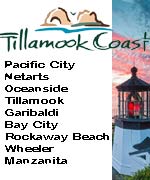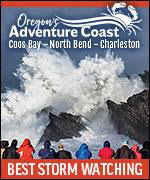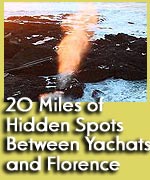 |
Oregon Coast Could Get Awesome Glimpses of Perseid Meteor Showers
Published 07/31/2013
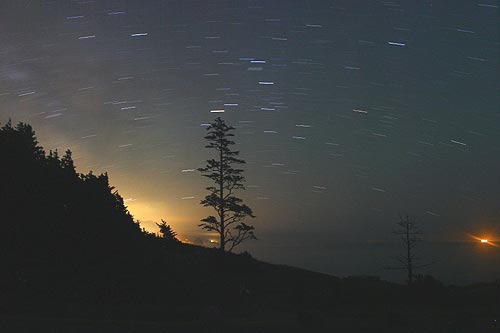
(Oregon Coast) – On one hand, the skies are clearer out here because it's far away from city lights. But the flipside is this is the Oregon coast, after all, and the clouds don't always go away when they're supposed to. (Above: Cannon Beach at night)
Either way, it's the Perseid Meteor Showers starting right about now, and the Oregon coast will – weather permitting – be an incredible place to see them. The shower is one of the biggest of the entire year, and when it peaks in a couple weeks you may be able to see as many as 30 to 40 shooting stars per hour.
Jim Todd, planetarium manager at Portland's OMSI, said the peak is coming up on August 12 and 13, a time which also brings some OMSI star viewing parties to the Oregon coast range and the Columbia Gorge.
These and other meteor showers happen when this planet wanders through debris paths left by comets zooming past, as the tiny particles burn up in the Earth's atmosphere. Todd said these little bits of rock and dust are meteoroids, and they hit the outer atmosphere at thousands of miles an hour.
“Most are destroyed during entry; the rare few that survive and hit the ground are known as meteorites,” Todd said.
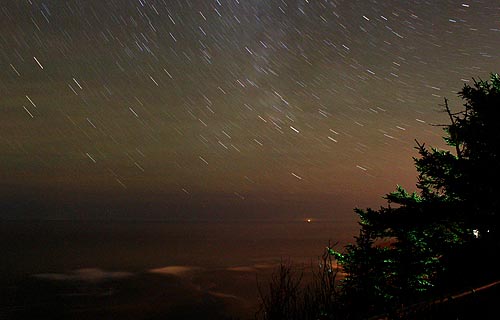
Above: Cape Foulweather
The Perseids come from a comet called Swift-Tuttle, which last swung this way in December 1992, Todd said. As these comets orbit the Sun, they shed an icy, dusty debris stream along the comet's orbit. If Earth travels through this stream, this will be seen as a meteor shower. Depending on where Earth and the stream meet, meteors appear to fall from a particular place in the sky, maybe within the neighborhood of a constellation, known as a Radiant.
The peak of the Perseids is predicted to be August 12, 5:15 am to August 13, 4:45 pm PDT. But the shower lasts until August 24, however, so Todd suggested you can still see some good little fireballs on either side of the peak.
“Estimate peak rates for the Perseid are near 50 to 60 per hour, for those under transparent rural skies,” Todd said. Those under dark but hazy skies should still be able to see 30 to 40 Perseids per hour. Those under urban skies will be lucky to exceed 10 to 15 per hour. The Moon will be a waxing crescent approaching first quarter on August 14, so will set early enough to create no problems for observers. “
Todd suggested to find an observation spot with a wide view of the sky and as few obstructions as possible.
“If you're viewing from the city, try to observe where artificial lights obstruct the least,” Todd said.
Should the nocturnal weather cooperate on the Oregon coast, you may still run into slightly misty air that could dampen your view a bit.
High vantage points will be excellent, like just south of Yachats, Cape Foulweather near Depoe Bay, the cliffs just south of Cannon Beach, the Neahkahnie overlooks by Manzanita and some pullouts near Oceanside and Cape Lookout will be good.
If you hit the beaches at night, make sure you keep safety in mind and watch closely what the tide is doing. To be more certain, stick to broad beaches like Seaside, Warrenton, Cannon Beach, Lincoln City, Pacific City, Waldport and most of Newport.
Not all flat beaches in Lincoln City or Newport will be completely dark, so you may need to scout a bit.
Gleneden Beach, Oceanside and Arch Cape may not be good for this as the tide can be awfully close, as well as the beach below Otter Rock and other beaches just north of Newport's Yaquina Head. Do not venture onto rocky ledges such as at Yachats or Depoe Bay in the dark, but there are plenty of viewing spots along Yachats' 804 Trail as well as dark pullouts around Depoe Bay.
OMSI will host two viewing parties on August 12 – one at Rooster Rock State Park and one at Stub Stewart State Park. Both begin at 9 p.m. OMSI staff will be presenting informal talks about the meteor shower, constellations, and the summer sky. On the scheduled day of each OMSI Star Party, it is suggested that interested visitors call the OMSI Star Parties Hotline, (503) 797-4000 #3 then #5, or check the OMSI Star Parties web site http://www.omsi.edu/starparties for possible weather-related cancellations.
More Oregon coast night photos below:
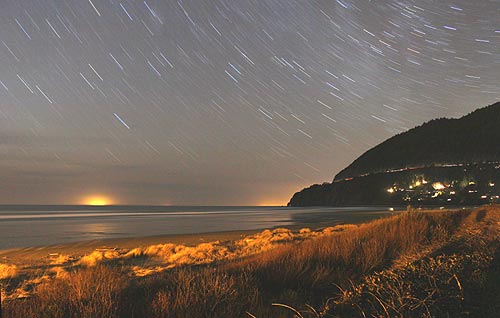
Manzanita
More About Oregon Coast hotels, lodging.....
More About Oregon Coast Restaurants, Dining.....
LATEST Related Oregon Coast Articles
Oregon Astronomer: Why Easter Moves Around, April's Meteor Showers |
Back to Oregon Coast
Contact Advertise on BeachConnection.net
All Content, unless otherwise attributed, copyright BeachConnection.net Unauthorized use or publication is not permitted
Secrets of the Season |
Unusual Travel Articles TravelParanormal.com allows you to submit your own creepy tale or debunk one - or see up-to-the-minute news headlines about travel and the paranormal. News Headlines from All Over Oregon Need to scan Oregon headlines? Constantly updated news from all over Oregon: a comprehensive, up-to-the-minute display of news headlines from a variety of media |



